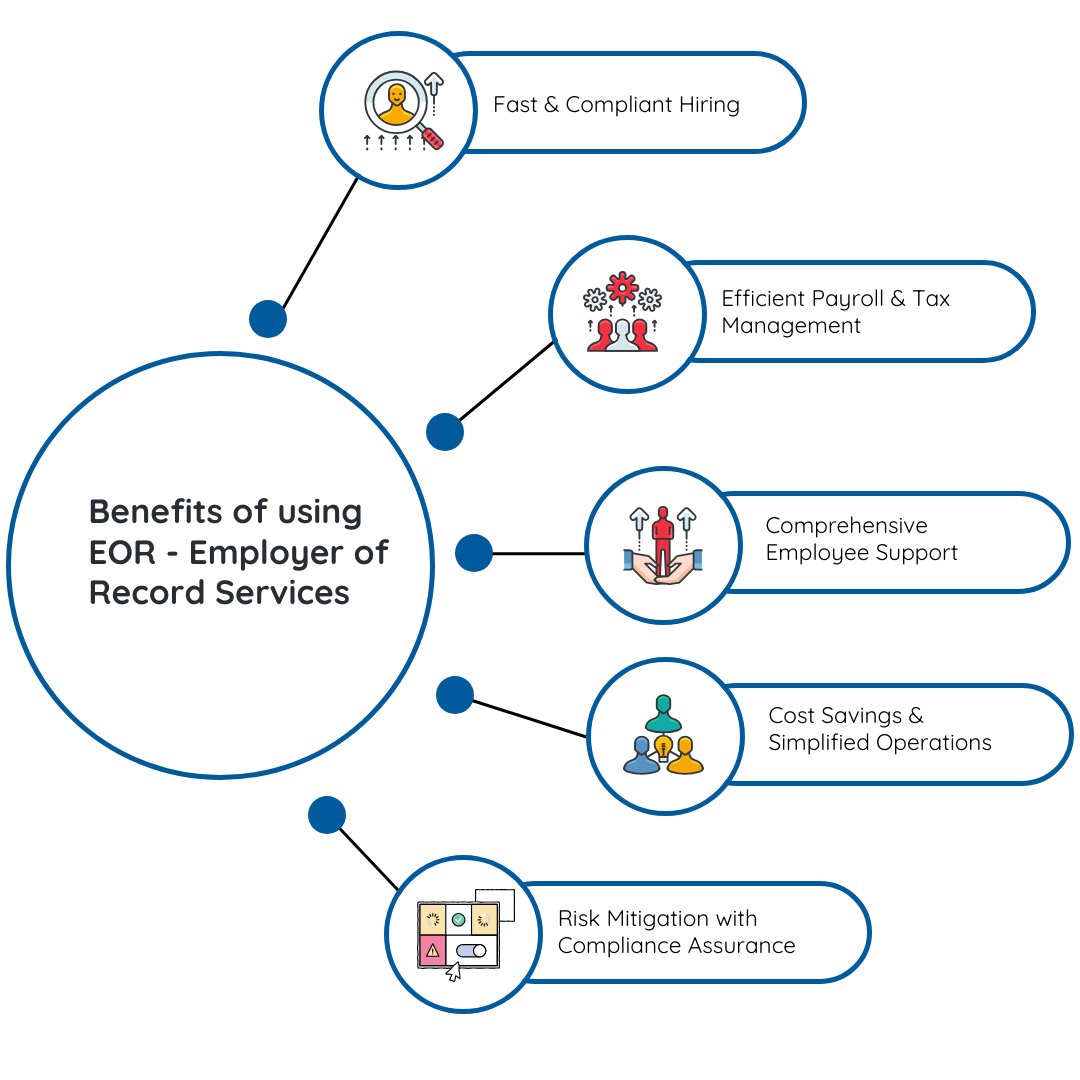Discover why startups are adopting EOR services in 2025 to hire globally, stay compliant, and scale faster without setting up legal entities.
EOR for Startups: The Smartest Way to Scale Without Setting Up Entities
What Is an EOR for Startups and Why It Matters in 2025
An EOR stands as a registered third-party entity that hires and manages employees on behalf of the client and in doing so handles every bit of that company, from compliance to payroll to contracts to shore up benefits to local labor law. This arrangement represents a massive benefit for startups wishing to enter the international market—all without carrying the heavy costs in the way of both money and time of setting up a legal business presence in each country.
In 2025, with remote work solidified as a norm, with talent becoming more and more borderless, EORs continue easing the global path toward expansion for startups by:
- Paying in cash while being compliant with local tax and labor law.
- Handling the employment contract and their benefits under legal termination conditions.
- Onboarding employees and supporting HR operationally.
- Legal employer status while operationally the startup does the day-to-day work.

Why EOR for Startups Is a Game-Changer in Early-Stage Growth
- Speed: Hire vetted talent in under 48 hours, across borders
- Compliance: Avoid legal headaches in unfamiliar markets
- Cost-Efficiency: Save 30–50% compared to establishing local subsidiaries
Founder Focus: Spend more time on product, not paperwork - Talent Access: Reach top-tier candidates from global pools
Suggested Read: Hire SEO Expert in India: The Ultimate 2025 Guide
| Aspect | Before EOR | After EOR |
| Time to Hire | 2–6 months (entity setup) | < 48 hours |
| Legal Headaches | High risk | Fully managed by EOR |
| HR Infrastructure | Build from scratch | Pre-built, plug-and-play |
| International Reach | Limited | Borderless |
| Founder Workload | Heavy on admin/compliance | Focused on core growth |
Who Should Consider Using EOR Services
Interestingly, once funded, startups generally aim to expand into new geographies; however, entity setup can delay hiring processes for months. An EOR, therefore, allows one to hire and test local markets right away, without waiting for registration on the legal and tax fronts.
- Remote-First Tech Companies
Building a distributed team from scratch? So, the EORs will allow you to legally employ developers, designers, and product talent across borders while being compliant with each country’s labor laws. They are perfect for the new-age async-first type of teams.
- Founders Testing New Geographies
Unsure as to whether the market would actually work? Hire one or two employees in the country through the EOR to conduct some operational, sales, or customer support activities, without committing long term or incurring sunk setup costs.
- Agencies and Service Providers With Distributed Teams
Marketing, development, and consulting agencies often favor specialized talent across the globe. Your EOR ensures that your global contractors or employees are hired legally, paid compliantly through payroll, and quickly integrated—allows you to spend more time with clients.
- Solo Founders and Lean Early Teams
If you’re a solo founder or a small founding team, managing HR, contracts, tax filings, and labor compliance across countries can be overwhelming. EORs handle all the admin, letting you focus on product development and customer acquisition.
- Startups Scaling Faster Than Their Legal Ops
Growth-stage startups often outpace their internal legal and HR capabilities. Instead of delaying hiring or taking compliance risks, EORs offer a plug-and-play HR infrastructure that grows with you.
Benefits of EOR for Startups Over Entity Setup
| Feature | EOR for Startups | Setting Up Legal Entity |
| Setup Time | 1–2 days | 2–6 months |
| Cost | Low to Medium | High (legal, infrastructure, HR) |
| Compliance Burden | Handled entirely by EOR | Fully on startup |
| Hiring Speed | Immediate | Delayed |
| Risk | Low (outsourced compliance) | High (local missteps possible) |
Key Features Startups Should Look for in an EOR
Not all EORs are made equal. Agility, transparency, and global compliance should be the basis on which a startup chooses an international hiring partner.
The must-have features for a startup-friendly EOR are as follows:
- Fast Onboarding Timelines
Time is money in the startup world. Look for an EOR that can onboard hires in as little as 1–3 business days in several countries.
- Local Compliance Expertise
The EOR should have an in-depth knowledge of labor laws, tax systems, and employment regulations in all countries where you engage the services of others so that you can be sure of a risk-free hiring and termination procedure.
- Transparent Pricing Model
Startups require predictable cost. An EOR should be selected that charges no hidden fees, flat price per employee, and clearly delineated scope of services.
- Employee Support at Large
From payroll and tax deductions to health insurance, leave management, and statutory benefits—your EOR should serve as a full-service HR back office.
- Contract Flexibility
Startups tend to pivot. Your EOR partner should be flexible with full-time or legally, part-time, fixed-term, or probationary-based contracts without long lock-ins.
Popular Roles Hired Through EOR by Startups
EORs allow startups to hire highly-skilled, global talent without worrying about local employment laws. Here are the most common roles startups are hiring through EOR services:
| Role | Avg. Monthly Salary (USD)* | Common Markets |
| React/Node.js Developers | $2,000–$3,500 | India, Eastern Europe |
| Flutter App Developers | $1,800–$3,000 | LATAM, India |
| UI/UX Designers | $1,500–$2,800 | Southeast Asia, Eastern EU |
| Product Managers | $2,500–$4,500 | Eastern Europe, SEA |
| Digital Marketers | $1,200–$2,500 | LATAM, Philippines |
| Customer Success Managers | $1,000–$2,000 | Africa, India, LATAM |
Global Markets Where EOR Helps Startups Expand
EORs are particularly valuable when growing in emerging and high-growth markets, where legal complexity and hiring friction are highest. These are the top regions where EOR enables startups to access talent and opportunities:
- Southeast Asia: Accelerating tech ecosystem, affordable skilled talent, English proficiency (Philippines, Vietnam, Indonesia)
- Eastern Europe: Highly qualified engineers and designers, robust work ethic, optimal time zone overlap (Ukraine, Poland, Romania)
- LATAM (Latin America): Well-liked among US-headquartered startups; nearshore proximity, tech talent surge (Brazil, Mexico, Colombia)
- India: Huge pool of engineering and support talent, affordable, excellent English communication
- Africa: Emerging digital talent pool, emerging tech hubs, low-cost labor (Nigeria, Kenya, South Africa).

How EOR for Startups Works Step-by-Step
Employing an EOR may seem complicated, but the process is really straightforward and efficient. Here’s what it involves for startups:
- Define Hiring Needs
Determine the positions you need to hire, their location, work type, and pay range. - Choose an EOR Partner
Choose an EOR that has operations in your desired countries and fits your startup’s growth strategy. - Draft Employment Contracts
The EOR drafts compliant employment agreements based on local labor regulations, such as IP, confidentiality, and benefits. - Onboard Employee
The EOR takes care of all formalities—documentation to account setup—while you onboard the employee into company culture and workflows. - Manage Payroll, Benefits & Taxes
The EOR pays the employee, taxes are deducted, social security is handled, benefits are offered, and complete statutory compliance is ensured. - Scale or Exit as Needed
As your business needs grow, you can hire more staff or offboard with notice, without legal hitches or long-term costs.

Legal & Compliance Advantages of EOR for Startups
One of the greatest value-adds of an EOR is the legal protection it gives to startups in onboarders from abroad. Here’s why EORs safeguard you:
- IP Ownership Clauses: Protect all work your employees do as belonging to your startup—no matter where they are located.
- GDPR-Compliant Contracts: EORs make sure data privacy regulations such as GDPR are upheld, particularly important for managing employee and customer information in the EU.
- Local Labor Laws Compliance: Employment agreements, termination policies, leave policy, and working hours are synchronized with local labor laws to prevent penalties.
- Payroll Tax Management: The EOR computes and pays taxes, insurance, and pension contributions to the authorities, ensuring you’re always compliant.
- NDAs and Data Protection: Legally binding confidentiality agreements are enforced by EORs to secure sensitive IP and business data.
Common Mistakes Startups Make Without an EOR
Omitting the use of an EOR can put early-stage startups at risk. The following are typical mistakes startups make while attempting to hire remotely on their own:
1. Misclassifying Employees as Contractors: A so-called contractor could end up being considered a legitimate employee by the law in some foreign countries, incurring penalties or legal action.
2. Disregarding Local Tax and Labor Regulations: Each country has specific employment and taxation regulations. Startups tend to miss social contributions, severance rules, and so on.
3. Legal Setup Represents Delayed Market Entry: Legal entity setup could take 3–6 months or longer, sliding product launches and go-to-market schedules.
4. Mismanagement & Payroll Mistakes: Inaccurate salary calculations, delayed tax payments, or benefits gaps could hurt both compliance and employee confidence.
5. No Official Benefits = Ineffective Retention: Absent legal employment, providing health insurance, paid time off, or pension benefits becomes more difficult—compromising talent retention.
Cost Comparison: EOR for Startups vs DIY Expansion
| Cost Type | EOR | Entity Setup (DIY) |
| Upfront Setup Cost | $0 – $1,000 | $5,000 – $25,000+ |
| Monthly Admin Cost | $300 – $1,000 / employee | $500 – $1,500+ |
| Hidden Legal Fees | Minimal (included) | High (legal, accounting) |
| Payroll Management | Included in EOR fee | Requires separate provider or team |
Suggested Read: Hire Software Developers in India | Models, Costs & Legal Guide [2025]
How to Choose the Right EOR for Your Startup
Not all EOR providers are alike when it comes to early-stage companies. To guarantee you’re selecting a partner that aligns with your growth, consider by these essential factors:
- Market Presence
Make certain the EOR is present in the nations where you intend to hire and has in-house experts—not merely third-party collaborators.
- Onboarding Speed
Time-to-hire matters. Prioritize providers that can onboard a new hire in under 72 hours, with automated documentation and digital workflows.
- Employee Support Quality
Your employees are working for the EOR—so the provider’s customer support team is representing your brand. Look for speedy payroll, benefits, and HR support.
- Tech Stack Integrations
Select an EOR that syncs with your HRIS, ATS, or payroll platforms (e.g., Slack, BambooHR, Deel, etc.) for simplicity and transparency.
- Pricing Model Transparency
Certain EORs pay a flat monthly rate, while others charge a percentage of salary. Know what’s included—i.e., taxes, benefits, compliance, support—before you make a decision.
FAQs: EOR for Startups
Yes. EORs are fully legal entities that employ workers on your behalf in countries where you don’t have a local presence. This ensures you stay compliant with local labor laws while hiring full-time remote talent across borders.
Most EOR providers can onboard employees within 48–72 hours after receiving required documentation. This makes it ideal for fast-paced startups that need to move quickly on talent offers.
Yes. Bonuses and performance-based incentives can be paid through the EOR’s payroll. Equity can also be offered, though it’s usually managed through a separate stock option plan at the startup level.
An EOR (Employer of Record) is the legal employer and takes full responsibility for compliance, payroll, and taxes in the employee’s country. A PEO (Professional Employer Organization) typically operates as a co-employer and is usually limited to domestic employment—making EORs better suited for global hiring.
Startups often begin with an EOR to test new markets, then transition employees to their own local entity once it’s set up. A good EOR provider will help with smooth offboarding and compliance during the switch.
Conclusion
EOR services are a game-changer for startups to scale internationally without having to establish legal entities in each market. An EOR takes care of compliance, payroll, contracts, and local labor laws so that founders can work on product and growth, and hire the best talent across borders—quickly and compliantly. Whether you’re scaling a remote-first team, expanding to new markets, or just experimenting with a region, selecting the right EOR accelerates your growth, minimizes risk, and keeps you lean. In 2025, savvy international expansion begins with an EOR.
Not to be considered as tax, legal, financial or HR advice. Regulations change over time so please consult a lawyer, accountant or Labour Law expert for specific guidance.

